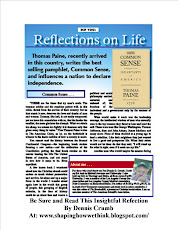 "Live as free men, but do not use your freedom as a cover-up for evil; live as servants of God" (1 Peter 2:16).
"Live as free men, but do not use your freedom as a cover-up for evil; live as servants of God" (1 Peter 2:16). He is better known for his writing than for his preaching — his sermons are unknown, while Pilgrim’s Progress is perhaps the best known book in all Christian literature apart from the Bible. Nevertheless he was an active preacher; he could move men to God by the preached word as well as by the written word.
Bunyan lived in one of the most significant periods in English history. His was an age of famous men: when Bunyan was born, Richard Baxter was thirteen years of age; George Fox, the founder of Friends, was four; John Milton was twenty; Oliver Cromwell was twenty-eight; Shakespeare had been dead for only twelve years. The colonists in New England had suffered through eight winters; those in Virginia had moved toward the building of a permanent colony after twenty-one years of labor.After a long struggle and great consideration, he professed faith in Jesus Christ and was baptized by John Gifford. Bunyan became a member of the Baptist Church at Bedford in 1653. To Bunyan’s great sorrow, his wife died in 1655. Her Christian influence continued through him: in that same year he began to preach. People responded enthusiastically to him and to his message. He continued to follow his trade as a tinker, preaching as he moved from house to house and village to village. During this time Bunyan also began to do some writing; his first writing was directed against the Quakers. In 1659 he married his second wife, Elizabeth, who was to be an effective helpmate in the troubled years ahead.
In 1660 Charles II took the throne of England. By the restoration of the Act of Uniformity, Bunyan was forbidden by the government to preach. He refused to obey the government order, was arrested, and thrown in jail.
Even while in prison Bunyan preached. He won the confidence of the jailers, who released him to go into the woods to proclaim a sermon to his congregation and then return to prison. He also preached through the bars of his cell and often talked to his jailers about the truth of the gospel.
In 1666 he was released from prison. He immediately began to preach, was promptly rearrested and returned to jail. He spent another six years in Bedford jail. His twelve years’ imprisonment might be attributed to mere stubbornness; it should more properly be attributed to his deep commitment to religious liberty and his refusal to acknowledge the supremacy of secular government over the church.
Released from prison in 1672, Bunyan became pastor of the Bedford Baptist Church where he served as a distinguished pastor. He not only preached in his own church but also in the surrounding territory; he made trips to London to visit with friends and to proclaim the gospel. Often, with only one day’s notice, his crowds would be so huge that the places of worship could not hold them.
John Bunyan was a preacher who dealt forthrightly with the issues of his day. He thundered against the vice and corruption creeping across the nation as a shadow cast by the degenerate court of Charles II. He also grappled with the problem of government and its relation to churches. By his life, his writing, and his preaching, Bunyan pled for the cause of religious liberty. Others may have argued more brilliantly, but none were more persuasive in the cause for freedom of religion.
In our post-modern secular humanistic world that we live in there is a clarion call for Christians to stand up for the faith. The issues Paul Bunyan faced are not different from our today. Jesus gave us our marching orders it up to us to obey. "But in your hearts set apart Christ as Lord. Always be prepared to give an answer to everyone who asks you to give the reason for the hope you have" (1 Peter 3:15). Get into a good teaching Bible study and if your church does not offer one, find one, or start one. "Therefore, since Christ suffered in his body, arm yourselves also with the same attitude...." (1 Peter 4:1a). Jesus' attitude was as a "suffering servant" he came to serve and save mankind. We are to be Him as His body until He returns. The world needs what we have to offer.
Daily Prayer:
Father God, Teach me, lead me; use the talents and gifts you have given me to present Jesus to the world. I humble myself before you with a heart of thankfulness for the salvation and forgiveness you have given to me. Humble me more, I want more of you. Then Lord send me out. Amen





No comments:
Post a Comment